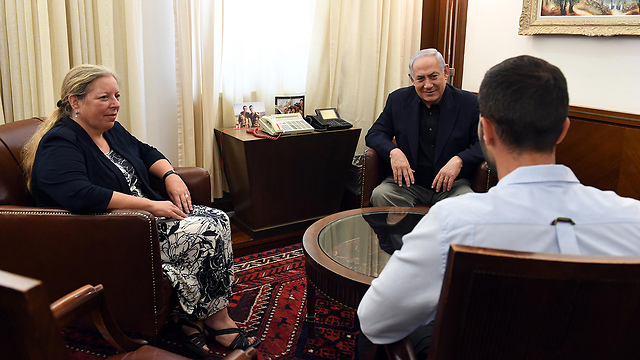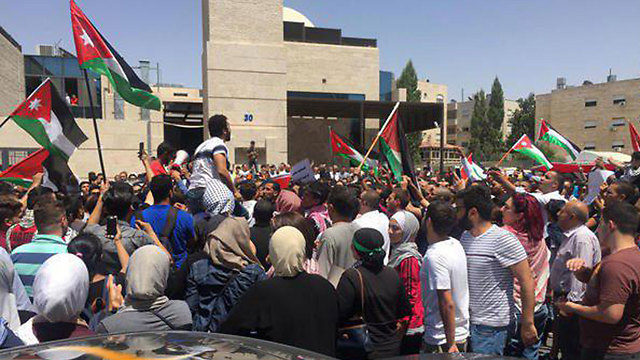
Economic cooperation is the only way to mend Jordan-Israel ties
Analysis: Both sides have been scarred by the embassy shooting affair. Whoever says our strategic ties with Jordan are important must create an economic department at the embassy and open Israel up to Jordan’s business community; with a lot of patience and creative thought, it will work.
Three people arrived at the rented apartment: Mohammed Jawawdeh, 17, who came to install furniture at the flat; the landlord, Dr. Bashar Hamarneh, an orthopedist; and Ziv Moyal, the security guard. The bullets fired from Moyal’s personal weapon killed the two citizens. The boy likely tried to stab Moyal once he discovered that he was Israeli, and the doctor got caught in the middle while trying to calm the situation down.
When Prime Minister Benjamin Netanyahu, who is familiar with the circumstances of the incident, announces that both sides are now drawing their conclusions, he is likely referring to the failures too: The Israeli guard could have prevented the incident had he got another Israeli to escort him to the apartment, and Netanyahu could have avoided the unnecessary reception he held at his bureau for the security guard and the Israeli ambassador, which ruined her career and got on the Jordanian king’s nerves.
Jordan isn’t Turkey, and King Abdullah isn’t President Recep Tayyip Erdogan. Jordan is the back gate of the State of Israel, which was familiar with the sensitivities and pressures even before the peace agreement. One could say both sides learned how to steal a lot of bad horses together and knew how to put out fires in fascinating places. Israel has a lot of respect for the kingdom’s security apparatuses, and vice versa. When needed, the gate opens and the convoy enters.
For half a year, Israel kept running after the intelligence apparatuses in Amman in an effort to end the affair. King Abdullah referred to the two citizens killed in the embassy incident as “my sons,” after Prime Minister Netanyahu failed to pick up the phone and call him. Had Netanyahu called, the problem wouldn’t have been dragged on for so long.
The street increased its pressure. The parliament called for a cancellation of the peace agreement—they hate Israel there anyway—and the Jordanians adopted the Marmara precedent and presented four conditions for ending the affair: A public apology, compensation payment to the victims’ families, prosecution of the guard and a replacement of ambassador whose career was “finished” during a live broadcast.

After seeing the eagerness in Jerusalem, they added the name of judge Raed Zeiter, who was shot to death by an Israeli security guard at the Allenby Bridge border crossing in March 2014. Israel didn’t reveal the circumstances of that incident either. Israel may be right, but it’s also possible that the guard should have exercised restraint instead of shooting. Whoever was in charge of the negotiations made it clear from the very first moment, however, that there was no chance an Israeli guard would be prosecuted.
The deal, which was reached two months ago and was suspended following US President Donald Trump’s Jerusalem announcement, was nearly ruined over the weekend. Media Affairs Minister Mohammad al-Momani was enlisted to prove that Jordan had made Netanyahu fold: Israel expressed its deep regret and apologized, the three victims’ relatives announced in front of the cameras that “we got what we deserved,” and Jordan deleted Ambassador Einat Shlain and revealed an Israeli commitment to pursue the legal proceedings against security guard Moyal.
The next day, the Prime Minister’s Office insisted on releasing a different version, which only mentioned “the understandings” that had led to the end of the two affairs. Israel stressed the importance of the strategic ties, without a word of apology, regret or a commitment to pay compensation.
The Jordanian fury chased Netanyahu all the way to India. He was forced to convene the Israeli reporters and present a refurbished version: Israel is expressing regret (but isn’t apologizing), Israel will pay ($5 million) to the Jordanian government (which will transfer the money to the killed citizens’ families), and Israel will keep investigating the circumstances of the embassy shooting incident. At the same time, a tender has been issued for the position of Israel’s next ambassador in Amman.
At the end of the day, both sides have been scarred by this affair. No matter who becomes the next ambassador, he will receive a gloomy reception. The apparatuses here and there will operate over his head, and the street will stick to its hostility. It doesn’t take an expert to guess what will happen when the Israeli ambassador tries to pave his way through Amman’s political circles.
The only solution can be found in the economic cooperation. Up until now, Israel has been perceived in Jordan as the rich, arrogant neighbor. The late King Hussein used to complain that the amount of paperwork from the Israeli proposals for businesses initiatives was enough to build separation walls. The Israelis come to plant dreams, pose for photographs in the palace, and fade away.
Whoever says the strategic ties with Jordan are important must create an economic department at the embassy, equip the next ambassador with plans and open Israel up to Jordan’s business community. With a lot of patience and creative thought, it will work.












